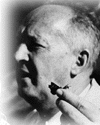by Amy Gembala, Class of 2000
as printed in The Wellesley News, spring 1998
In 1941, when the author/critic/translator Vladimir Nabokov first visited Wellesley as a resident lecturer, his novel Lolita was fourteen years away from its first publication. Best known as the author who introduced the word "nymphet" into the English language, Nabokov should also be remembered as the founder of Wellesley's Russian Department. Nabokov came to Wellesley via Russia, Europe and California. Born in St. Petersburg in 1899, he grew up speaking Russian and English and received his B.A. from Cambridge University. During the 1920s and 1930s, he lived in Berlin and Paris with his wife Vera and young son Dmitri, publishing original and translated works including the first Russian-language version of Carroll's Alice's Adventures in Wonderland. At the outbreak of World War II, the family left France for the United States. Nabokov taught that fall he arrived at Wellesley for a year-long stint as resident lecturer in comparative literature, a position created specifically for him. His lecture series on major nineteenth- century Russian writers was hailed as "funny," "learned," and "brilliantly satirical." During this time, the Nabokovs resided in Wellesley.
Nabokov came to Wellesley via Russia, Europe and California. Born in St. Petersburg in 1899, he grew up speaking Russian and English and received his B.A. from Cambridge University. During the 1920s and 1930s, he lived in Berlin and Paris with his wife Vera and young son Dmitri, publishing original and translated works including the first Russian-language version of Carroll's Alice's Adventures in Wonderland. At the outbreak of World War II, the family left France for the United States. Nabokov taught that fall he arrived at Wellesley for a year-long stint as resident lecturer in comparative literature, a position created specifically for him. His lecture series on major nineteenth- century Russian writers was hailed as "funny," "learned," and "brilliantly satirical." During this time, the Nabokovs resided in Wellesley.
Following a lecture tour through the United States, Nabokov returned to Wellesley for the 1944-45 academic year as a lecturer in Russian. The faculty questionnaire he completed upon his arrival provides a glimpse of his characteristic self-deprecation: under "outside interests," he wrote "creative writing" and "entomology" (he was a passionate and renowned lepidopterist, or butterfly expert; one species is even named for him). He was to serve through the 1947-48 term as Wellesley's one-man Russian Department, offering courses in Russian language and literature. His classes were wildly popular, due as much to his unique teaching style as to the wartime interest in all things Russian. Hannah Green '48, writing in the February 1977 New Yorker, said that he taught his students "to take literature seriously and what is ordinarily said about it lightly." Refraining from discussions of conflict, theme, or symbolism, he simply wanted to make literature come alive. He was an eloquent lecturer; Green recalled "His words, his wonderful words!" He also made his students learn his grading system for Russian authors: Tolstoi got an A+, Pushkin a solid A and Dostoevskii a C- or D+. Remembered as a Bohemian by some and a gentleman by others, he evinced a general attitude of what Green called "gentle dismay," a "bemused acceptance of what fate had dealt him: American college girls." A 1942 Legenda photo depicts Nabokov and Vera drinking tea at the Phi Sigma Society house, with a caption describing Nabokov as "a new honorary member."
Hannah Green '48, writing in the February 1977 New Yorker, said that he taught his students "to take literature seriously and what is ordinarily said about it lightly." Refraining from discussions of conflict, theme, or symbolism, he simply wanted to make literature come alive. He was an eloquent lecturer; Green recalled "His words, his wonderful words!" He also made his students learn his grading system for Russian authors: Tolstoi got an A+, Pushkin a solid A and Dostoevskii a C- or D+. Remembered as a Bohemian by some and a gentleman by others, he evinced a general attitude of what Green called "gentle dismay," a "bemused acceptance of what fate had dealt him: American college girls." A 1942 Legenda photo depicts Nabokov and Vera drinking tea at the Phi Sigma Society house, with a caption describing Nabokov as "a new honorary member."
Nabokov left Wellesley in 1948 to become chairman of Cornell's comparative literature department. With the 1955 publication of Lolita in Paris (legal wrangling held up U.S. publication until 1958) and his subsequent acclaim as one of America's greatest novelists, his fortunes were assured. He retired in 1958 to Montreux, Switzerland, where he lived until his death in July 1977, calling himself to the end an "obscure novelist with an unpronounceable name."
